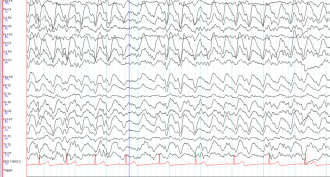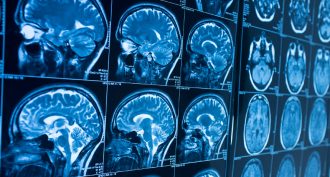MS-LS1-8
Gather and synthesize information that sensory receptors respond to stimuli by sending messages to the brain for immediate behavior or storage as memories.
-
 Health & Medicine
Health & Medicine‘Ringing’ in the ears may signal serious ear damage
A persistent ringing in the ears, also known as tinnitus, has become common in teens — and may point to eventual, permanent hearing loss.
By Lela Nargi -
 Fossils
FossilsDino brain found ‘pickled’ in boggy swamp
Scientists claim to have identified the first fossil brain tissue from a dinosaur.
By Meghan Rosen -
 Brain
BrainPain is contagious — at least in mice
Pain can move from one mouse to another. The trigger may be smell.
-
 Brain
BrainThese scientists are getting inside your head
You brain might only weigh few pounds, but there’s a whole world in there. Meet the women in science who are digging into the mysteries of the mind.
-
 Brain
BrainCool Jobs: Video game creators
Meet an engineer who worked on StarCraft II, an expert building a new kind of reality and a neuroscientist who uses games as brain therapy.
-
 Brain
BrainGood dog! Canine brains separate tone of speech from its meaning
Dogs brains divide up the tasks of interpreting words and interpreting emotion. It’s a skill that may have evolved even before people did.
-
 Tech
TechOne day, computers may decode your dreams
Scientists are learning how to translate brain activity into words and thoughts. This may one day allow people to control devices with their minds.
-
 Brain
BrainExplainer: How to read brain activity
Electricity underlies the chattering of brain cells. Here’s how scientists eavesdrop on those conversations.
-
 Health & Medicine
Health & MedicineBlame your ‘environment’ for your taste in music
Some scientists had thought we are born with our musical tastes. But a new study finds that what the ear prefers depends on what we listened to as we were growing up.
-
 Health & Medicine
Health & MedicineTo remember something new: Exercise!
People who exercised strenuously for a half hour after learning something new cemented those memories. But the trick: Wait four hours before getting the heart pumping vigorously.
-
 Brain
BrainHormone affects how teens’ brains control emotions
Using scans of brain activity, scientists show that surging hormones drive where emotions get processed in a teen’s brain.
-
 Brain
BrainTeen drinking may damage ability to cope with stress
Teens are often tempted to drink alcohol. Drinking too much — and repeatedly — can hurt their ability to manage stress, a study in rats indicates.